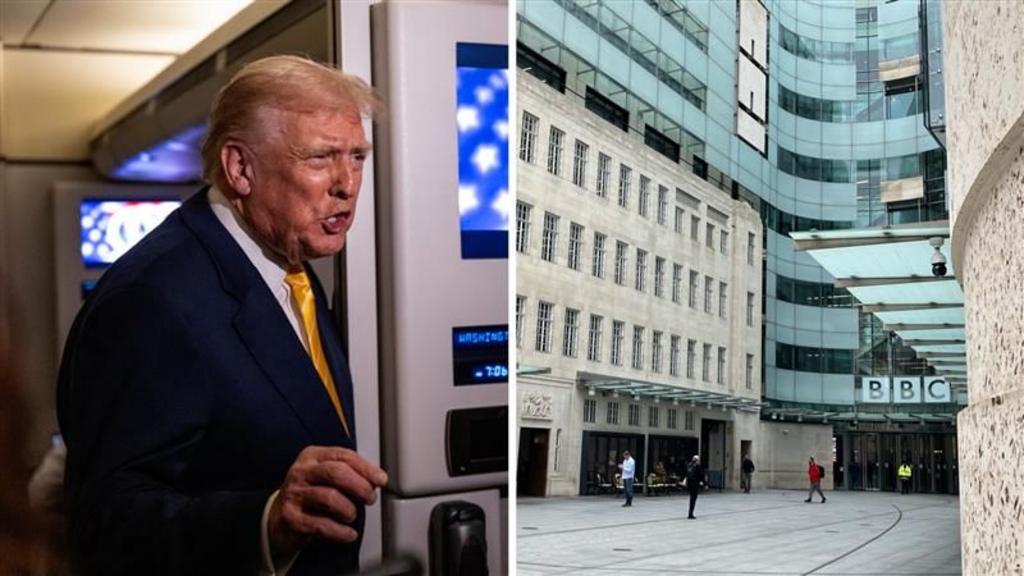Former U.S. President Donald Trump has stated his intention to pursue legal action against the BBC, citing the editing of his speech in a Panorama program. This follows an apology from the corporation, which, however, declined to offer financial compensation.
Speaking to reporters aboard Air Force One on Friday evening, Trump asserted, “We’ll sue them for anywhere between $1bn [£759m] and $5bn, probably sometime next week.”
On Thursday, the BBC acknowledged that the editing of the January 6, 2021, speech had unintentionally created “the mistaken impression that President Trump had made a direct call for violent action” and confirmed that the segment would not be rebroadcast.
The corporation issued an apology to the former president but maintained its stance against providing financial compensation.
This statement from the BBC was prompted by threats from Trump’s legal representatives to sue the broadcaster for $1 billion in damages, contingent upon the issuance of a retraction, apology, and compensation.
“I think I have to do it,” Trump told reporters, referring to his plan to initiate legal proceedings. “They cheated. They changed the words coming out of my mouth.”
The former president noted that he had not discussed the matter with Sir Keir Starmer, but that the current Prime Minister had requested a conversation. Trump indicated he would contact Starmer over the weekend.
As of Friday evening, a search of public court record databases confirmed that no lawsuit had been filed in either federal or state court in Florida.
A BBC spokesperson stated on Saturday evening: “We have had no further contact from President Trump’s lawyers at this point.
“Our position remains the same.”
In a separate interview recorded on Saturday, prior to his remarks on Air Force One, Trump expressed his belief that he had an “obligation” to sue the BBC, arguing, “If you don’t do it, you don’t stop it from happening again with other people.”
He characterized the editing as “egregious” and “worse than the Kamala thing,” alluding to a prior dispute with CBS News over an interview with his 2024 election rival, Kamala Harris, on the program 60 Minutes.
Earlier this year, in July, U.S. media conglomerate Paramount Global reached a settlement for $16m (£13.5m) to resolve a legal dispute related to the aforementioned interview.
Sir Craig Oliver, a former BBC editor and former director of politics and communications for former Prime Minister David Cameron, described the situation as a “nightmare” for the public broadcaster on BBC Today.
“The problem is that public money could be spent fighting this or settling this,” Sir Craig said, adding that Trump doesn’t “understand the BBC, how it is funded or how it works”.
The controversy centers around the editing of Trump’s January 6, 2021, speech by Panorama for a documentary broadcast in October 2024. During the address, he told supporters: “We’re going to walk down to the Capitol, and we’re going to cheer on our brave senators and congressmen and women.”
Later in the speech, more than 50 minutes later, he stated: “And we fight. We fight like hell.”
In the Panorama program, the clip presented him as saying: “We’re going to walk down to the Capitol… and I’ll be there with you. And we fight. We fight like hell.”
The controversy surrounding the editing of Trump’s speech has resulted in the resignations of BBC director general Tim Davie and head of news Deborah Turness.
In its Corrections and Clarifications section, published on Thursday evening, the BBC stated that the Panorama program had undergone review following criticism regarding the editing of Trump’s speech.
“We accept that our edit unintentionally created the impression that we were showing a single continuous section of the speech, rather than excerpts from different points in the speech, and that this gave the mistaken impression that President Trump had made a direct call for violent action,” the statement read.
A BBC spokesperson confirmed that lawyers for the BBC have been in communication with Trump’s legal team this week.
“BBC chair Samir Shah has separately sent a personal letter to the White House making clear to President Trump that he and the corporation are sorry for the edit of the president’s speech on 6 January 2021, which featured in the programme,” they said.
They added: “While the BBC sincerely regrets the manner in which the video clip was edited, we strongly disagree there is a basis for a defamation claim.”
In its letter to Trump’s legal team, the BBC outlined five key arguments explaining why it believes it does not have a case to answer.
Firstly, it asserted that the BBC lacked the rights to, and did not, distribute the Panorama episode on its U.S. channels.
When the documentary was available on BBC iPlayer, access was restricted to viewers within the UK.
Secondly, the BBC contended that the documentary did not inflict harm upon Trump, as he was re-elected shortly thereafter.
Thirdly, it stated that the clip was not intended to mislead but rather to condense a lengthy speech, and that the editing was not carried out with malicious intent.
Fourthly, the BBC argued that the clip was never meant to be viewed in isolation. Instead, it constituted 12 seconds within an hour-long program that also featured numerous voices in support of Trump.
Finally, the BBC emphasized that opinions on matters of public concern and political speech receive substantial protection under U.S. defamation laws.
The BBC’s apology followed the revelation, hours earlier, by the Daily Telegraph of a second similarly edited clip, which had been broadcast on Newsnight in 2022.

